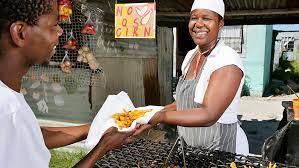Thriving township economy vital to SA's economic revival

Informal businesses operate within a multitude of industries and offer goods and services that meet various social and economic needs within township communities. Retail dominates the informal township economy, with spaza shops, fast food outlets, bakeries, shebeens and hawkers. Additional businesses include backroom rentals, minibus taxi operators, mechanics and panel beaters, metal fabricators, childcare services, barbers and hair salons among others.
Informal economy’s economic contributions & Informal enterprises contribute an estimated 6% to GDP. However, while informal businesses pay VAT on their purchases, the sector is unregulated. “As such,” explains Hodes, “it is not protected by legislated labour laws, like minimum wage. Indeed, many informal operators earn below the income tax threshold legislated by SARS. Typical earnings for informal sector employees are less than half those in the formal sector. According to Stats SA, the median income of workers in the informal sector is about R2,000 per month, compared to R4,300 in the formal sector. Self-employed workers, particularly men, earned more – R6,700 per month, on average
Challenges facing township entrepreneurs
Despite their relevance and importance in the local economy, informal businesses face numerous challenges. For instance, these enterprises are vulnerable to crime and police harassment. Entrepreneurs also often struggle with a lack of general business knowledge and skills. And financial exclusion means businesses have little or no access to capital, credit and transactional facilities, mortgage loans, asset finance or insurance;It's a challenge Xolisa Menemene, a candidate of the Investec sponsored Startup School faced when starting a radiography business community.